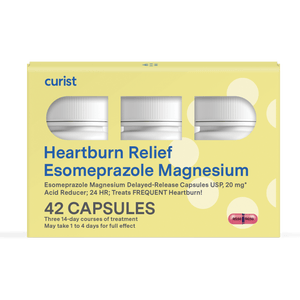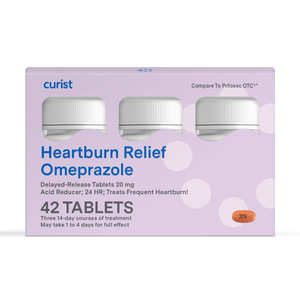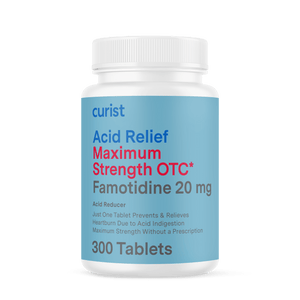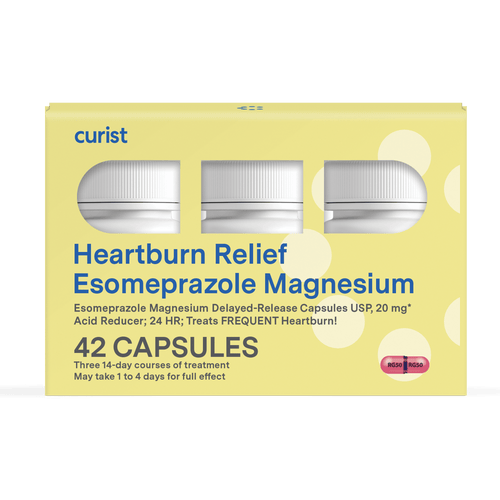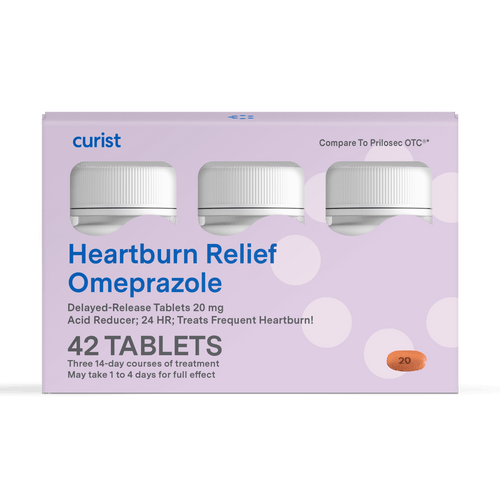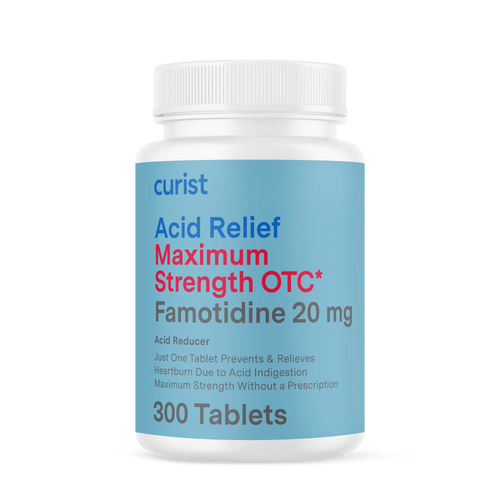Curist delivers over-the-counter medicines to your door at a fraction of the price of traditional brands. We hope everyone stays safe and healthy during this time..
Pregnancy is an exciting time of anticipation in a woman’s life, but it can also be one filled with uncertainty and challenges. We understand that anxiety arises when the mother-to-be needs to take great care to ensure that the unborn baby is safe and developing normally.
In this article, we answer all your questions about how safe it is to take over-the-counter medications for heartburn and acid reflux (specifically omeprazole and esomeprazole) during pregnancy, and whether those medications increase the risks of miscarriages, birth defects, and other pregnancy complications.
What is Omeprazole and Esomeprazole, and How Do They Help Treat Heartburn?
Omeprazole and Esomeprazole are both proton pump inhibitors (PPIs). This class of over-the-counter medications is used to treat frequent heartburn or acid reflux that occurs 2 or more times per week. They work by decreasing the amount of acid that the stomach produces and are more effective in providing long-lasting heartburn relief than H2 blockers or antacids.
If I Take Omeprazole or Esomeprazole, Is It Harder For Me to Get Pregnant?
No, there is not evidence that taking omeprazole or esomeprazole can make it harder for you to become pregnant. However, if you have already started taking either medication while pregnant, consult with your doctor or pharmacist immediately. They can decide whether or not you still need the medication and advise you on the lowest possible dose that is effective in reducing your heartburn or acid reflux symptoms. Research studies done in animals show no evidence that omeprazole or esomeprazole can make it harder to become pregnant; but high dosages can still be risky, and therefore it is best to consult with your doctor or pharmacist first.
I Just Found Out I Am Pregnant: Should I Stop Taking Omeprazole or Esomeprazole?
We recommend that you consult with your doctor or pharmacist first before making any changes to how you take your medication(s), including omeprazole and esomeprazole, when you learn that you are pregnant. For some people, the benefits of being treated for acid reflux (or other conditions that omeprazole and esomeprazole treat) need to be weighed against the risks of untreated illness. Your healthcare providers can help you decide what treatment is best for you and your pregnancy.
Can Taking Omeprazole or Esomeprazole Increase the Chance for Miscarriage?
Unfortunately, miscarriage can occur in any pregnancy. Current available research findings do not suggest a higher chance for miscarriage with the use of omeprazole or esomeprazole during pregnancy.
Can Taking Omeprazole Increase the Chance of Having a Baby with a Birth Defect? Does Esomeprazole Increase Birth Defects?
First, it is important to keep in mind that every pregnancy starts out with a 3-5% chance of having a birth defect. This is known as the background risk. Current available studies suggest that it is unlikely that taking either omeprazole or esomeprazole during pregnancy would increase the chance for birth defects over the background risk.
Can Taking Omeprazole or Esomeprazole Cause Other Pregnancy Complications?
While the data is limited, available information does not suggest a higher chance for low birth weight (less than 5lbs 8oz) or preterm birth (delivery before 37 weeks of pregnancy) or other problems with the use of omeprazole or esomeprazole during pregnancy.
Can I Breastfeed While Taking Omeprazole? Can I Breastfeed While Taking Esomeprazole?
Both omeprazole and esomeprazole enter the breast milk in small amounts. They will be broken down in the baby’s stomach acid and will not be absorbed. In research, no harmful effects were found in the infant for mothers who were breastfeeding and taking omeprazole 20 mg per day (the standard dosage for over-the-counter omeprazole). Less data is known about taking esomeprazole while breastfeeding but limited data did suggest that esomeprazole is also considered unlikely to be harmful. We highly encourage you to ask your doctor or pharmacist about all of your breastfeeding questions.
Is There Any Risk If the Father is Taking PPIs (Esomeprazole or Omeprazole) While Trying to Get Pregnant?
This topic has not been well studied, and there are limited studies looking at the effects of using PPIs (like omeprazole and esomeprazole) on male fertility. One study found that when PPIs were used for any period between 6 and 12 months, sperm count was decreased. However, a more recent study looking at the effects of PPI use on male fertility did not support these findings, with their study showing that PPI use was not associated with any negative impact on sperm count or quality.
Based on these limited data and findings, it can be concluded that exposures that fathers and sperm donors have are unlikely to increase the risks to a pregnancy. Please discuss further with your healthcare provider.
Where Can I Buy Esomeprazole and Omeprazole Online?
The over-the-counter versions of esomeprazole and omeprazole are available in local pharmacies as well as stores online like Curist, and do not need a prescription.
At Curist, we develop FDA-approved equivalents to big brands in order to provide the same medicine relief but at half the price of the brands. Curist products are sold online and shipped directly to your door. To learn more about these medicines, checkout our FAQs on esomeprazole and omeprazole.
For more information about heartburn and various relief options, check out Curist’s other articles about heartburn:
- Can Stress Cause Heartburn or Make Heartburn Worse?
- Common Heartburn Myths and Facts
- Nexium vs. Prilosec vs. Pepcid vs. Tums
- Omeprazole vs. Esomeprazole: Which Heartburn Medicine is Better?
- Nexium vs. Prilosec: Which Heartburn Medicine is Better?
- Tips to Relieve Heartburn at Night
- Tips to Prevent Heartburn and Acid Reflux




